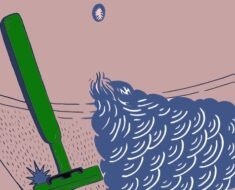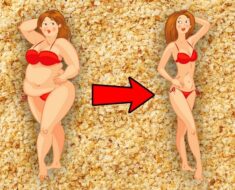
Ugh, the dreaded post-meal (or anytime) bloat.
Can’t live with it, just can’t seem to live without it, am I right?
Trust me, I’ve been there and it seems like it’s just a part of life.
Well… I’m here to tell you it doesn’t have to be.
There are many different reasons you may experience bloating, and figuring out which one(s) is to blame will help you leave the bloat behind for good.
What Causes Bloating?
There are a number of possible reasons you may experience bloating from time to time.
For most people, it’s usually fairly harmless and can be caused from gas, indigestion, or food intolerances.
However, bloating may be a symptom of underlying chronic health issues.
Gas
A common cause of bloating is from a build-up of gas in the gastrointestinal (GI) tract.
It is often caused by:
- The digestion of food
- Eating or drinking too fast
- Eating certain gas-inducing foods
- Indigestion
Indigestion
Indigestion, or dyspepsia, is pain or discomfort in the stomach region.
Common causes of indigestion are:
- Eating too much
- Fatty, greasy, or spicy foods
- Too much caffeine, chocolate (caffeine), alcohol, or carbonated drinks
- Certain medications that upset the stomach (like ibuprofen)
Food Intolerances
Certain foods can cause bloating in some individuals.
A food sensitivity test may indicate certain foods your body doesn’t respond well to.
Or, you can try an elimination diet by cutting out certain foods and reintroducing them to see if they’re the cause of your bloat.
I personally have sensitivities to corn, rice, and coffee and have noticed a tremendous reduction in bloating by cutting out these foods and anything that contains them.
With food intolerances, you have to pay attention to ingredients in everything. Certain medications may contain foods you’re trying to avoid without you knowing it.
Two of my prescriptions (and Ibuprofen!) contain corn or corn derivatives and it wasn’t until a few years of taking them I realized this.
Switching to alternatives without corn has made bloating almost a thing of the past for me. And it could do the same for you!
Chronic Disorders
Another, more serious, cause of bloating is a chronic gut disorder.
Irritable bowl syndrome (IBS) and Crohn’s Disease are both common chronic health issues that cause gas and bloating.
Seek professional medical advice if you believe you may suffer from a chronic gut disorder.
How to Get Rid of Bloat Naturally
The good news is, bloating is usually a temporary problem that’s most likely a result of air becoming trapped in your stomach.
This pesky problem can usually be cleared up with a few simple tricks to your diet and routine.
Let’s get to it, shall we?
1. Eliminate Food Allergies and Intolerances
Food allergies and intolerances are an extremely common cause of bloating.
Consuming foods you’re allergic or intolerant to can cause digestive upset and bloating.
Common foods that can cause reactions include:
- Dairy: Lactose is a natural sugar found in dairy products known to cause bloating, gas, and other digestive issues.
- Eggs: Allergies to eggs, usually egg whites, can result in unwanted gas and bloating.
- Gluten: Gluten is a family of proteins found in grains like barley, rye, spelt, and wheat. It can cause various symptoms, bloating being one of them.
- Soy: Soy has estrogen-like effects which can cause bloating and abdominal upset.
Trying an elimination diet or getting a food sensitivity test can help you determine if any foods are triggers for you so you can avoid them.
2. Reduce Sodium Intake
Sodium is a known cause of bloating since it promotes water retention, meaning it causes the body to hold onto extra water.
This extra water is usually held in the abdominal region, making you feel bloated.
Eating salty foods increases your sodium intake which can lead to dehydration if you don’t drink enough water.
You should always check the sodium content when purchasing anything other than whole foods to ensure you’re not consuming more than the recommended daily allowance (RDA).
Some common sodium-rich foods to avoid include:
- Cheese
- Cold cuts and deli meat
- Frozen dinners (i.e. Lean Cuisine, Amy’s Bowls, Healthy Choice)
- Packaged meals (i.e. Pasta Roni, Macaroni and Cheese)
- Processed snacks
- Sauces & condiments (i.e. ketchup, soy sauce)
Dehydration can also result in bloating since your body is trying to hold on to as much water as it can, being that water is vital for proper organ functions.
To prevent dehydration and water retention, make sure you’re staying hydrated!
3. Limit High-Fiber Foods
Fiber is a carbohydrate that the body can’t digest.
While it’s an important nutrient for healthy bowel functions, some people may experience bloating as a result of high fiber consumption.
Avoid high-fiber foods like:
- Cruciferous vegetables (broccoli, cauliflower, kale, brussels sprouts)
- Legumes (beans, lentils, peas)
- Fruits (apples, oranges)
4. Incorporate Soothing Herbs
There are certain herbs, known as carminative herbs, that help soothe the digestive tract and relieve gas.
The two most common carminative herbs are ginger and peppermint, but there are plenty of others such as fennel and chamomile.
Ginger has been used for thousands of years to calm digestive upset due to it’s anti-inflammatory properties.
Peppermint is another stomach-soothing herb commonly used to treat bloating.
An easy, and delicious, way to sneak these carminatives in is through herbal teas.
You can also add them to a smoothie, use as a seasoning in your meals, or use essential oils.
5. Don’t Forget Potassium
Potassium is a vital mineral, more specifically an electrolyte, that plays an important role in proper cell function.
Foods rich in potassium help offset some of the harmful effect’s of sodium and reduce bloating.
Try adding more of these whole foods rich in potassium to your diet to get rid of bloat:
- Avocados
- Bananas
- Fennel (also contains anethole, a phytonutrient that helps fight inflammation)
- Leafy greens
- Oranges
- Papaya (also contains papain, an important enzyme for digestion)
- Pumpkin
- Sweet potato
6. Eat & Drink Slowly
Eating too fast causes gas to build up in your stomach.
Eating or drinking too quickly increases the amount of air you swallow which leads to more gas build-up in the GI tract.
A simple remedy to reduce bloating is to simply eat and drink slower.
Put your spoon or fork down in between bites and don’t chug your drink.
7. Don’t Overeat
Overeating doesn’t actually cause bloating, but it may be the reason your stomach feels so uncomfortable.
This is because eating too much makes you feel stuffed, quite similar to the feeling of being bloated, and causes indigestion.
I get it – food is delicious and you want to savor as much of it as you can. But indigestion and uncomfortable feeling associated with it is never a good thing.
So instead of eating large meals, have three normal sized meals and little snacks throughout the day.
Tip: Restaurants usually serve over-sized portions, so when eating out immediately put half of the meal in a to-go box to prevent you from overeating.
8. Ditch Carbonated Drinks
The carbon dioxide in carbonated drinks is a gas that can build up in the GI tract and cause bloating.
Due to this, you should skip carbonated drinks and opt for water or tea to stay hydrated.
Remember, staying hydrated helps reduce water retention and therefore bloat while drinking herbals teas with ginger or peppermint can also keep you bloat-free.
9. Move Your Body After Eating
Guilty of sitting on the couch after dinner?
One study found that light exercise, such as using a stationary bike, helps remove gas from the GI tract and reduce symptoms of bloating.
So remember to get up and move, whether it’s a short walk or just to stretch your body, to eliminate any built-up gas.
10. Stop Chewing Gum
Just like eating or drinking too quickly, chewing gum causes you to swallow more air.
The more air in your GI tract, the more likely you are to experience unwanted bloating.
11. Treat Your Heartburn
Heartburn is a result of a weakened lower esophageal sphincter that allows stomach acid to travel back up the esophagus.
Often times, the burning sensation in your chest is accompanied by bloating.
Eliminating common heartburn-inducing foods can also eliminate bloat.
Another option is taking over-the-counter medications such as antacids or talking with your doctor to discuss further options.





